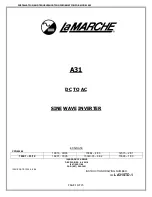
Page 26
Shut-down due to reversal of polarity at the DC input terminals.
The positive of the
battery should be connected to the positive DC input terminal of the inverter, (the tip of
the cigarette lighter plug), and the negative of the battery should be connected to the
negative DC input terminal of the inverter (The spring loaded bow type contacts of the
cigarette lighter plug). A reversal of polarity (the positive of the battery
wrongly connected
to the negative DC input terminal of the inverter and the negative of the battery
wrongly
connected
to the positive DC input terminal of the inverter) will blow the DC side fuses
inside the inverter
.
If the DC side fuse is blown, the inverter will be dead. The LED (2)
will be switched off and there will be no AC output.
The internal fuse should be replaced
with the correct size of fuse shown under specifications. If the unit does not work after
replacing the fuse, it has been permanently damaged. Please call Technical Support for
assistance.
Shut-down due to over-temperature.
In case of failure of the cooling fan or in the case
of inadequate heat removal due to higher ambient temperatures / insufficient air ex-
change, the temperature inside the unit will increase. The temperature of a critical hot
spot inside the inverter is monitored and at 95
o
C, the AC output of the inverter is shut
down temporarily. The
LED (2) turns orange and a buzzer is sounded. The unit will
automatically reset after the hot spot has cooled down to 70
o
C.
Shut down due to overload.
The inverter can provide a higher than normal instantaneous
(< 1 second) power limited to the surge power rating of the inverter. Also, the inverter can
provide continuous power limited to the continuous power rating of the inverter. If there
is an overload beyond the specified limits, the AC output of the unit will be shut down
permanently. LED (2) will turn orange and buzzer alarm will be sounded. The unit will be
required to be reset manually by switching the unit off and on again. Before switching on
the unit, please remove the cause of the overload.






































